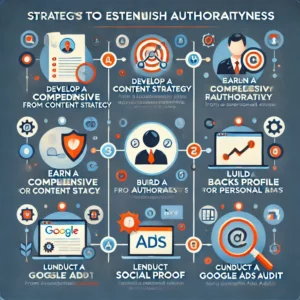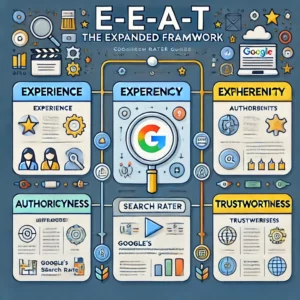Understanding EEAT: How Expertise, Authoritativeness, and Trustworthiness Impact Your Google Rankings

In the ever-evolving landscape of SEO, understanding the concept of EAT—Expertise, Authoritativeness, and Trustworthiness—is vital for improving your Google rankings. EAT is not a direct ranking factor but a framework Google uses to evaluate the quality and reliability of online content. By focusing on these three pillars, you can enhance your website’s visibility, credibility, and user trust, ultimately leading to better search engine performance.
Key Takeaways for EEAT
- EAT stands for Expertise, Authoritativeness, and Trustworthiness, and is a critical framework for evaluating content quality.
- Google uses EAT to ensure that the information it surfaces is reliable, credible, and comes from authoritative sources.
- Expertise can be demonstrated through high-quality, well-researched content that reflects a deep understanding of the subject matter.
- Authoritativeness is built by establishing your website as a go-to source for information, often through backlinks and citations from other reputable sites.
- Trustworthiness involves clear authorship, transparency, and responsible information gathering, which all contribute to higher user trust and satisfaction.
The Role of Expertise in Google Rankings
Defining Expertise in Content Creation for EEAT
Expertise refers to the depth of knowledge and proficiency demonstrated by the creators of a website’s content in their respective fields. Google evaluates expertise based on factors such as the qualifications, experience, and credentials of the content creators. Google wants to deliver valuable and reliable content to its users, and websites that showcase expertise are more likely to be rewarded with higher rankings.
How Google Evaluates Expertise
Google isn’t satisfied with merely good content; it craves content from individuals who truly know their stuff. In the vast digital realm, where information is abundant and sometimes unreliable, Google aims to provide its users with the most accurate and valuable results. Google evaluates expertise by looking at the qualifications, experience, and credentials of the content creators. This includes academic degrees, professional certifications, and real-world experience in the subject matter.
Ways to Demonstrate Expertise on Your Website
One can illustrate their expertise in a particular field by providing these pieces of information:
- Providing High-Quality Content: It indicates your knowledge in your specified field. The content should be well-researched, accurate, and detailed, and offer valuable insights or solutions to the user.
- Showcasing Credentials: Displaying the qualifications and experience of your content creators can help establish expertise.
- Citing Authoritative Sources: Referencing well-known and respected sources can enhance the credibility of your content.
By focusing on expertise, authoritativeness, and trustworthiness, you can improve your website’s overall quality, enhance user experience, and potentially achieve better rankings.
Incorporating these strategies can also benefit your Google ads PPC and Google Adwords PPC campaigns, as users are more likely to trust and engage with content that demonstrates expertise. This, in turn, can improve the performance of your PPC management efforts and make your site more attractive to Google ads agencies and PPC ad agencies. Ultimately, building expertise can make your site a valuable asset for Google advertising agencies.
EEAT: Building Authoritativeness for Better SEO
What Makes a Source Authoritative?
Authoritativeness pertains to the reputation and influence of a website within its niche or industry. Google assesses authoritativeness based on various factors, including the quantity and quality of backlinks from other reputable websites, as well as mentions and citations from credible sources. Websites that are widely recognised as authorities in their respective fields are more likely to be considered authoritative by Google and, consequently, receive higher rankings in search results.
Strategies to Establish Authoritativeness
Building authoritativeness requires actively seeking out opportunities to earn backlinks from reputable sources and establishing relationships with industry influencers and thought leaders. Here are some strategies to help you establish authoritativeness:
- Develop a comprehensive content strategy: Your content strategy should cover all aspects of your niche, providing reliable information and showcasing your expertise.
- Earn backlinks from authoritative sites: Focus on acquiring backlinks from trusted sources to boost your website’s credibility.
- Build a digital profile or personal brand: Establish yourself or your business as an expert in your field by consistently delivering high-quality content and engaging with your audience.
- Leverage social proof: Showcase testimonials, case studies, and endorsements from satisfied clients and industry experts.
- Conduct a Google ads audit: Regularly perform a PPC audit to ensure your campaigns are optimised and demonstrate your expertise in managing PPC eCommerce agency services.
Case Studies of Authoritative Websites
Examining case studies of authoritative websites can provide valuable insights into how they achieved their status. Here are a few examples:
- Moz: Known for its expertise in SEO, Moz has built a strong reputation by consistently publishing high-quality content, conducting original research, and earning backlinks from reputable sources.
- Neil Patel: As a renowned digital marketing expert, Neil Patel has established his authority through a combination of in-depth blog posts, informative videos, and speaking engagements at industry conferences.
- HubSpot: This inbound marketing giant has become an authoritative source by offering a wealth of resources, including blog articles, eBooks, and webinars, all aimed at helping businesses improve their marketing efforts.
By providing reliable information, earning backlinks from trusted sources, cultivating a positive reputation, showcasing expertise, and consistently delivering high-quality content, your website can climb the ranks and gain more visibility.
In conclusion, building authoritativeness is a multifaceted process that involves creating valuable content, earning backlinks, and establishing a strong online presence. By following these strategies, you can enhance your website’s authority and improve your Google rankings.
Trustworthiness: The Cornerstone of EAT
Elements of Trustworthy Content
Trustworthiness is a critical component of EAT, and it encompasses several key elements. Transparency is paramount; disclose affiliations, potential conflicts of interest, and editorial policies. User-centricity is also essential—prioritise user needs and address their concerns honestly and clearly. Additionally, implementing strong security measures and clear privacy policies can significantly enhance your site’s trustworthiness.
Importance of Clear Authorship
Clear authorship is another vital aspect of trustworthiness. Ensure that every piece of content on your site has a clearly identified author with verifiable credentials. This not only adds a layer of credibility but also allows users to assess the expertise behind the information. Including author bios and links to their professional profiles can further bolster trust.
Building Trust Through Transparency
Building trust through transparency involves more than just clear authorship. It requires a commitment to openness in all aspects of your website. Regularly update your content to reflect the latest information and be upfront about any changes or corrections. Engage with your audience by responding to comments and feedback, demonstrating that you value their input and are committed to providing accurate and reliable information.
Remember, EAT is not just a one-time effort but an ongoing commitment to providing valuable and reliable content to your audience. By consistently upholding these principles, you can establish your website as a credible source and reap the rewards in terms of improved search rankings and user trust.
E-E-A-T: The Expanded Framework
Google has recently expanded its evaluation criteria to include E-E-A-T, which stands for Experience, Expertise, Authoritativeness, and Trustworthiness. This expanded framework brings an additional dimension into the equation, emphasising the importance of a writer’s experience with a given subject. E-E-A-T is now part of the updated search rater guidelines. You’ll also see clearer guidance throughout the guidelines underscoring the importance of content created to be original and helpful for people, and explaining that helpful information can come in a variety of different formats and from a range of sources.
Practical Tips to Enhance Your EAT Score
Creating High-Quality Content
To enhance your EAT score, focus on creating high-quality content that provides real value to your audience. Ensure your content is well-researched, accurate, and comprehensive. Use credible sources and cite them appropriately. High-quality content not only improves user experience but also signals to Google that your site is a reliable source of information.
Leveraging Authoritative Sources
Incorporate authoritative sources into your content to boost your site’s credibility. This can be done by linking to reputable websites, quoting experts, and referencing well-known publications. Authoritative sources lend weight to your content and help establish your site as a trusted resource.
Maintaining Consistent Updates (EEAT)
Regularly updating your content is crucial for maintaining its relevance and accuracy. Set a schedule for content reviews and updates to ensure that all information remains current. This practice not only enhances trustworthiness but also signals to Google that your site is actively maintained.
Consistency in updates demonstrates your commitment to providing accurate and up-to-date information, which is essential for building trust with both your audience and search engines.
Common Misconceptions About EEAT
EEAT as a Direct Ranking Factor
One of the most common misconceptions is that EAT (Expertise, Authoritativeness, Trustworthiness) is a direct ranking factor. This is not the case. Google has clarified that EAT is not a specific ranking factor but rather a concept used by their search quality evaluators to assess the overall quality of content. Instead of being a direct factor, EAT influences how other ranking factors are perceived and weighted.
The Role of Human Raters
Another misunderstanding is the role of human raters in the EAT evaluation process. Human raters do not directly affect your site’s rankings. They provide feedback to help Google improve its algorithms. Their evaluations are used to train the algorithm to better understand what high-quality content looks like. This means that while their assessments are important, they do not directly change your rankings.
Debunking EEAT Myths
There are several myths surrounding EAT that need to be debunked. For instance, some believe that having a high EAT score alone will guarantee top rankings. This is not true. While EAT is important, it works in conjunction with other SEO practices. Additionally, some think that EAT is only relevant for YMYL (Your Money or Your Life) sites. While it is crucial for these types of sites, EAT principles apply to all websites aiming for high-quality content.
Remember, optimising your website for EAT involves providing valuable content, demonstrating expertise, building authority, and cultivating trust with your audience and search engines.
Conclusion
In conclusion, understanding the concept of EAT—Expertise, Authoritativeness, and Trustworthiness—and its impact on Google rankings is crucial for anyone involved in website management or content creation. While EAT itself is not a direct ranking factor, it serves as a vital framework that Google uses to evaluate the quality and reliability of web content. By focusing on these key qualities, you can significantly enhance your website’s visibility and credibility. Ensure that your content is well-researched, comes from authoritative sources, and clearly demonstrates expertise in your field. By doing so, you not only improve your chances of ranking higher in search results but also contribute to a more trustworthy and satisfying user experience.
Frequently Asked Questions for EEAT
What does EAT stand for in SEO?
EAT stands for Expertise, Authoritativeness, and Trustworthiness. It is a framework used by Google to assess the quality and reliability of content on websites.
Is EAT a direct ranking factor in Google’s algorithm?
While EAT itself is not a direct ranking factor, it significantly influences Google’s assessment of content quality, which in turn affects rankings.
Why is EAT important for Google SEO?
EAT is important for Google SEO because it ensures that content is reliable, credible, and trustworthy. This helps improve user trust and satisfaction, which can positively impact search rankings.
How can I demonstrate expertise on my website?
You can demonstrate expertise by creating high-quality content that is well-researched and authored by individuals with recognised expertise in the subject matter.
What is the difference between EAT and E-E-A-T?
E-E-A-T stands for Experience, Expertise, Authoritativeness, and Trustworthiness. The additional ‘E’ for Experience emphasises the importance of the author’s firsthand experience with the subject matter.
How do human raters evaluate EEAT?
Human raters use Google’s Search Quality Evaluator Guidelines to assess the credibility and reliability of content based on EAT principles. Their evaluations help inform Google’s search algorithms.
Author
Search Blog
Free PPC Audit
Subscribe to our Newsletter
The Voices of Our Success: Your Words, Our Pride
Don't just take our word for it. With over 100+ five-star reviews, we let our work-and our satisfied clients-speak for us.
"We have been working with PPC Geeks for around 6 months and have found Mark and the team to be very impressive. Having worked with a few companies in this and similar sectors, I rate PPC Geeks as the strongest I have come across. They have taken time to understand our business, our market and competitors and supported us to devise a strategy to generate business. I value the expertise Mark and his team provide and trust them to make the best recommendations for the long-term."
~ Just Go, Alasdair Anderson




